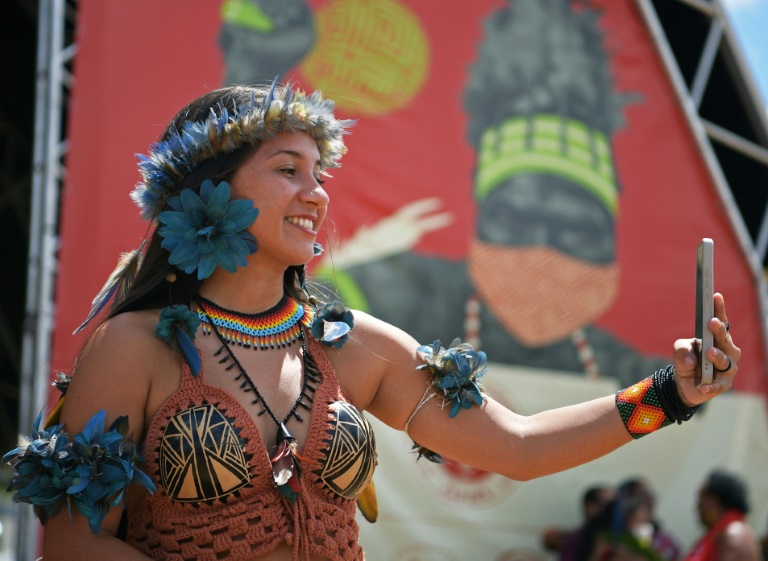SOCIAL
Brazil indigenous influencers take their fight online

Digital indigenous activist Samela Awia, of the Satere Mawe Amazonian tribe, makes a video of herself to post on her social media, at the Terra Livre Indigenous Camp in Brasilia – Copyright AFP/File –
Marcelo SILVA, Valeria PACHECO
Clutching an iPhone in each hand, and sporting a feather headdress and traditional indigenous garb, Brazilian influencer Samela Awia, a member of the Amazon rainforest’s Satere-Mawe people, checks out her latest video, then posts it online.
“Good stuff,” says the 25-year-old after uploading the video, a recap of news from a tent city near the seat of government in Brasilia, where she and thousands of other indigenous Brazilians have been camped out since last week protesting far-right President Jair Bolsonaro’s policies.
“Hi, this is Samela, coming to you from the indigenous camp,” she tells her 54,000 followers in the mini-report, decked out in a coconut shell-and-crochet bustier, colorful beads and blue flower armbands.
“Come with me, I’ll show you what’s going on,” says the self-described artisan and digital activist from Manaus, the city known as the “capital of the Amazon.”
The indigenous camp, an annual event, has focused this year on mobilizing public opinion against a series of Bolsonaro initiatives that critics say would be disastrous for native peoples and the environment, including bills that would sharply limit the creation of new indigenous reservations and open existing ones to mining.
But in addition to the camp, young and tech-savvy indigenous influencers are increasingly taking their cause online.
“Indigenous leaders before us had other tools, other weapons to fight. Our generation has a new form of resistance, the internet and social networks, and it’s making a big difference,” Awia told AFP.
– ‘iPhone Indians’ –
Brazil is home to around 900,000 indigenous people.
They make up 0.5 percent of the population, but play an outsize role in protecting the environment: experts say creating and safeguarding indigenous reservations is one of the best ways to preserve the world’s forests, key resources in the race to curb climate change.
Victims of mass killings and horrific abuses throughout the nation’s history, indigenous Brazilians still often face violence, discrimination and rights violations today.
Indigenous influencers see part of their role as combatting the prejudice their people face.
Tukuma Pataxo, 22, recently posted a video taking on a question he says he gets constantly: “Aren’t you too modern to be indigenous?”
“Are we supposed to be stuck in time?” he asks in the accompanying message, hitting out at the derogatory phrase sometimes applied to people like him: “iPhone Indians.”
With 172,000 followers, Pataxo, who comes from the ethnic group of the same name in the northeastern state of Bahia, is a celebrity at the protest camp, where fellow demonstrators constantly stop him and ask to take a picture.
“Young people are super important in the (indigenous) struggle. Our elders started coming to Brasilia years ago as a way to fight for their land. They didn’t even know where they were going or how to get here, but they came,” says Pataxo.
“Now, we have a whole new platform with technology on our side, which lets us bring our fight to the entire world.”
Source link
SOCIAL
Snapchat Explores New Messaging Retention Feature: A Game-Changer or Risky Move?

In a recent announcement, Snapchat revealed a groundbreaking update that challenges its traditional design ethos. The platform is experimenting with an option that allows users to defy the 24-hour auto-delete rule, a feature synonymous with Snapchat’s ephemeral messaging model.
The proposed change aims to introduce a “Never delete” option in messaging retention settings, aligning Snapchat more closely with conventional messaging apps. While this move may blur Snapchat’s distinctive selling point, Snap appears convinced of its necessity.
According to Snap, the decision stems from user feedback and a commitment to innovation based on user needs. The company aims to provide greater flexibility and control over conversations, catering to the preferences of its community.
Currently undergoing trials in select markets, the new feature empowers users to adjust retention settings on a conversation-by-conversation basis. Flexibility remains paramount, with participants able to modify settings within chats and receive in-chat notifications to ensure transparency.
Snapchat underscores that the default auto-delete feature will persist, reinforcing its design philosophy centered on ephemerality. However, with the app gaining traction as a primary messaging platform, the option offers users a means to preserve longer chat histories.
The update marks a pivotal moment for Snapchat, renowned for its disappearing message premise, especially popular among younger demographics. Retaining this focus has been pivotal to Snapchat’s identity, but the shift suggests a broader strategy aimed at diversifying its user base.
This strategy may appeal particularly to older demographics, potentially extending Snapchat’s relevance as users age. By emulating features of conventional messaging platforms, Snapchat seeks to enhance its appeal and broaden its reach.
Yet, the introduction of message retention poses questions about Snapchat’s uniqueness. While addressing user demands, the risk of diluting Snapchat’s distinctiveness looms large.
As Snapchat ventures into uncharted territory, the outcome of this experiment remains uncertain. Will message retention propel Snapchat to new heights, or will it compromise the platform’s uniqueness?
Only time will tell.
SOCIAL
Catering to specific audience boosts your business, says accountant turned coach

While it is tempting to try to appeal to a broad audience, the founder of alcohol-free coaching service Just the Tonic, Sandra Parker, believes the best thing you can do for your business is focus on your niche. Here’s how she did just that.
When running a business, reaching out to as many clients as possible can be tempting. But it also risks making your marketing “too generic,” warns Sandra Parker, the founder of Just The Tonic Coaching.
“From the very start of my business, I knew exactly who I could help and who I couldn’t,” Parker told My Biggest Lessons.
Parker struggled with alcohol dependence as a young professional. Today, her business targets high-achieving individuals who face challenges similar to those she had early in her career.
“I understand their frustrations, I understand their fears, and I understand their coping mechanisms and the stories they’re telling themselves,” Parker said. “Because of that, I’m able to market very effectively, to speak in a language that they understand, and am able to reach them.”Â
“I believe that it’s really important that you know exactly who your customer or your client is, and you target them, and you resist the temptation to make your marketing too generic to try and reach everyone,” she explained.
“If you speak specifically to your target clients, you will reach them, and I believe that’s the way that you’re going to be more successful.
Watch the video for more of Sandra Parker’s biggest lessons.
SOCIAL
Instagram Tests Live-Stream Games to Enhance Engagement

Instagram’s testing out some new options to help spice up your live-streams in the app, with some live broadcasters now able to select a game that they can play with viewers in-stream.
As you can see in these example screens, posted by Ahmed Ghanem, some creators now have the option to play either “This or That”, a question and answer prompt that you can share with your viewers, or “Trivia”, to generate more engagement within your IG live-streams.
That could be a simple way to spark more conversation and interaction, which could then lead into further engagement opportunities from your live audience.
Meta’s been exploring more ways to make live-streaming a bigger consideration for IG creators, with a view to live-streams potentially catching on with more users.
That includes the gradual expansion of its “Stars” live-stream donation program, giving more creators in more regions a means to accept donations from live-stream viewers, while back in December, Instagram also added some new options to make it easier to go live using third-party tools via desktop PCs.
Live streaming has been a major shift in China, where shopping live-streams, in particular, have led to massive opportunities for streaming platforms. They haven’t caught on in the same way in Western regions, but as TikTok and YouTube look to push live-stream adoption, there is still a chance that they will become a much bigger element in future.
Which is why IG is also trying to stay in touch, and add more ways for its creators to engage via streams. Live-stream games is another element within this, which could make this a better community-building, and potentially sales-driving option.
We’ve asked Instagram for more information on this test, and we’ll update this post if/when we hear back.
-

 PPC7 days ago
PPC7 days ago19 Best SEO Tools in 2024 (For Every Use Case)
-
SEARCHENGINES6 days ago
Daily Search Forum Recap: April 19, 2024
-

 WORDPRESS7 days ago
WORDPRESS7 days agoHow to Make $5000 of Passive Income Every Month in WordPress
-

 WORDPRESS5 days ago
WORDPRESS5 days ago13 Best HubSpot Alternatives for 2024 (Free + Paid)
-

 MARKETING6 days ago
MARKETING6 days agoBattling for Attention in the 2024 Election Year Media Frenzy
-

 SEO7 days ago
SEO7 days ago25 WordPress Alternatives Best For SEO
-

 WORDPRESS6 days ago
WORDPRESS6 days ago7 Best WooCommerce Points and Rewards Plugins (Free & Paid)
-

 AFFILIATE MARKETING7 days ago
AFFILIATE MARKETING7 days agoAI Will Transform the Workplace. Here’s How HR Can Prepare for It.
















You must be logged in to post a comment Login